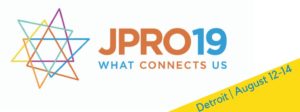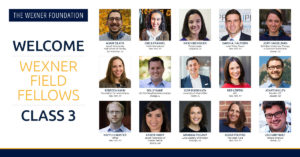Challenges facing youth are greater than ever—and anxiety rates are spiking. From growing pressure on academic achievement, to the 24/7 cycle of social media, to the rise of hate speech and violence rooted in anti-Semitism, racism, and sexism, youth need help. For 15 years, Moving Traditions has engaged parents, communal leaders, clergy, educators, and concerned adults to help Jewish pre-teens and teens to navigate this terrain and to flourish. Now, having just implemented a five-year strategic plan, the organization is poised to influence even more Jewish youth and families at this critical time.
It’s two flagship teen programs—Rosh Hodesh for girls, and Shevet for boys—have impacted thousands of teens who say overwhelmingly that because of these programs they are better able to handle stress and tackle problems; they have stronger Jewish identities; they are more aware of gender stereotypes and inequality, and they are inspired to speak up for social change. Last year, drawing from those key learnings and in partnership with Keshet, Moving Traditions launched Tzelem, geared specifically to support transgender, nonbinary, gender fluid, or gender questioning teens in the same areas as Rosh Hodesh and Shevet does for others. Tzelem groups, led by a trans or non-binary group leader, bring together teens from all over the country once a month via video conference to focus on topics like courage, friendship, stress, body image, and spirituality.
Along with these programs for teens, Moving Traditions has introduced a new model of family education through its B’nai Mitzvah program, which works with clergy and Jewish educators to help families navigate this life stage by addressing the joys and challenges of becoming and parenting a teen. The programs fosters dialogue between parents and pre-teens, and addresses the social-emotional needs of 6th and 7th graders in our society.
We discussed the 4 guidelines for disagreements at dinner tonight! We seldom actually follow up like this. It really helped keep us calmer and more focused. We even have a plan for resolving the conflict. No yelling so no post-disagreement guilt, and I know we were trying to solve the problem rather than win the argument. I hope we can keep this up.
—Parent participant
In all of this work, Moving Traditions looks to help pre-teens and teens navigate these challenges so that they will thrive and find meaning in Jewish life. Partnerships with synagogues, JCCs, camps, and other innovative and emergent communities are integral in this approach and to proactively addressing urgent issues. The organization’s new CultureShift initiative, for example, prepares senior camp leaders to train counselors to prevent sexual harassment and assault and to promote a culture of safety, equity and respect at camp. As one camp leader succinctly put it: “Communicating boundaries is part of our job.” As another example, Kol Koleinu is a national feminist fellowship for teen activists, in partnership with the Union for Reform Judaism, that inspires 10th-12th grade participants to deepen their feminist knowledge, amplify their voices, exert leadership and reshape the world.
Moving Traditions’ reach and impact will grow in the coming years, building on successes from its early programs while also supporting teens and families in new ways. Through these efforts, Jewish wisdom will be integrated into learning experiences to help Jewish youth grapple with questions of gender and identity, to learn to relate to others with compassion and respect, and to develop a moral compass.
For a taste of Moving Traditions’ programming, visit and enjoy their six-episode NPR-style podcast, @13, with rabbis, authors, comedians, psychologists, parents, and teens speaking about the ancient roots and modern realities of this Jewish rite of passage.
The Jim Joseph Foundation is a funder of Moving Traditions.
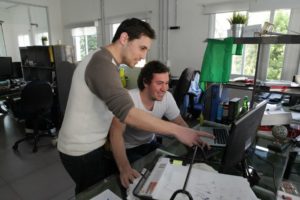 Israel’s vibrant economy, thriving technology and innovation sectors, and multi-cultural landscape make it an ideal place for college-age students looking to have a resume-enhancing experience that builds life-skills and can help them when they enter the workforce. Because they are immersed in the Israeli workplace and society—they are placed in housing and have opportunities to tour the country—participants return home with greater knowledge, sense of connection, and engagement in Jewish life and Israel. Evaluations of participants before and after the program show that they increase their knowledge about diversity and variety in Israeli life, society, and politics; their sense of responsibility and connection to Israelis and the Jewish people; the ability to explain to others why being Jewish and engaging with Israel are important; and knowledge of Judaism, Jewish communities, and the diversity of approaches to Judaism.
Israel’s vibrant economy, thriving technology and innovation sectors, and multi-cultural landscape make it an ideal place for college-age students looking to have a resume-enhancing experience that builds life-skills and can help them when they enter the workforce. Because they are immersed in the Israeli workplace and society—they are placed in housing and have opportunities to tour the country—participants return home with greater knowledge, sense of connection, and engagement in Jewish life and Israel. Evaluations of participants before and after the program show that they increase their knowledge about diversity and variety in Israeli life, society, and politics; their sense of responsibility and connection to Israelis and the Jewish people; the ability to explain to others why being Jewish and engaging with Israel are important; and knowledge of Judaism, Jewish communities, and the diversity of approaches to Judaism.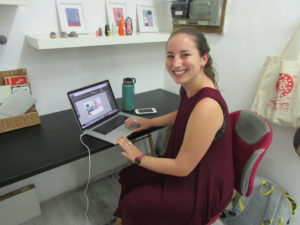
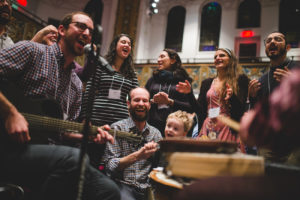 people with varying levels of knowledge, passions, and visions for future Jewish life. Hadar’s
people with varying levels of knowledge, passions, and visions for future Jewish life. Hadar’s 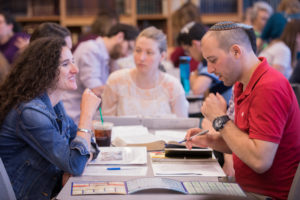 Hadar’s timely resources include a new
Hadar’s timely resources include a new 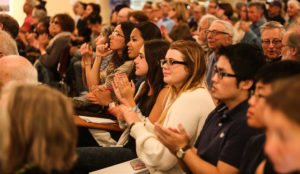 In recent years, the Institute hosted the annual meeting of the Association for Israel Studies, brought Israeli Supreme Court Justice Daphne Barak-Erez as The Rosalinde and Arthur Gilbert Foundation Scholar-in-Residence, sponsored courses ranging from Israeli Constitutional Law to Religion in Israel, and hosted up to five stellar visiting professors per year to teach and mentor in their areas of expertise.
In recent years, the Institute hosted the annual meeting of the Association for Israel Studies, brought Israeli Supreme Court Justice Daphne Barak-Erez as The Rosalinde and Arthur Gilbert Foundation Scholar-in-Residence, sponsored courses ranging from Israeli Constitutional Law to Religion in Israel, and hosted up to five stellar visiting professors per year to teach and mentor in their areas of expertise.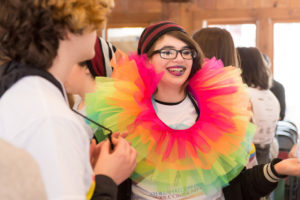 Last year, Keshet expanded the Shabbatonim to include the South and Midwest, in addition to those held in the East and West Coasts, so more queer Jewish teens have the space to be their full selves. All of this is in addition to Keshet’s year-round work engaging queer Jewish teens through programs, conferences, and workshops, and through training more than 1,500 youth professional who work with teens.
Last year, Keshet expanded the Shabbatonim to include the South and Midwest, in addition to those held in the East and West Coasts, so more queer Jewish teens have the space to be their full selves. All of this is in addition to Keshet’s year-round work engaging queer Jewish teens through programs, conferences, and workshops, and through training more than 1,500 youth professional who work with teens.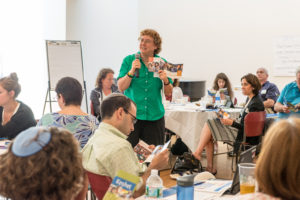
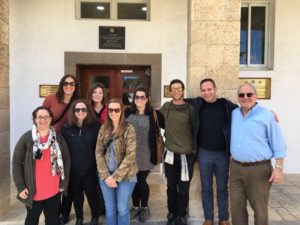 expanded programming and strengthened its organization. New programs such as
expanded programming and strengthened its organization. New programs such as 